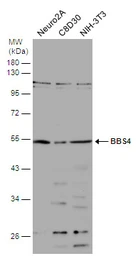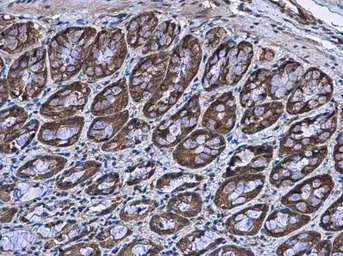APPLICATION
Application Note
*Optimal dilutions/concentrations should be determined by the researcher.
| Application |
Recommended Dilution |
| 1:500-1:3000 |
| 1:100-1:1000 |
Not tested in other applications.
Calculated MW
Positive Control
Neuro2A , C8D30 , NIH-3T3
Predict Reactivity
Human, Bovine, Pig, Chimpanzee(>80% identity)
PROPERTIES
Form
Liquid
Buffer
PBS, 20% Glycerol
Preservative
0.025% ProClin 300
Storage
Store as concentrated solution. Centrifuge briefly prior to opening vial. For short-term storage (1-2 weeks), store at 4ºC. For long-term storage, aliquot and store at -20ºC or below. Avoid multiple freeze-thaw cycles.
Concentration
1.04 mg/ml (Please refer to the vial label for the specific concentration.)
Antigen Species
Human
Immunogen
Recombinant protein encompassing a sequence within the N-terminus region of human BBS4. The exact sequence is proprietary.
Purification
Purified by antigen-affinity chromatography.
Conjugation
Unconjugated
RRID
AB_2886334
Note
For laboratory research use only. Not for any clinical, therapeutic, or diagnostic use in humans or animals. Not for animal or human consumption.
Purchasers shall not, and agree not to enable third parties to, analyze, copy, reverse engineer or otherwise attempt to determine the structure or sequence of the product.
TARGET
Synonyms
Bardet-Biedl syndrome 4
Cellular Localization
Centrosome , Cytoplasm , cytoskeleton , Cell projection , cilium membrane
Background
This gene is a member of the Bardet-Biedl syndrome (BBS) gene family. Bardet-Biedl syndrome is an autosomal recessive disorder characterized by severe pigmentary retinopathy, obesity, polydactyly, renal malformation and mental retardation. The proteins encoded by BBS gene family members are structurally diverse. The similar phenotypes exhibited by mutations in BBS gene family members are likely due to the protein's shared roles in cilia formation and function. Many BBS proteins localize to the basal bodies, ciliary axonemes, and pericentriolar regions of cells. BBS proteins may also be involved in intracellular trafficking via microtubule-related transport. The protein encoded by this gene has sequence similarity to O-linked N-acetylglucosamine (O-GlcNAc) transferases in plants and archaebacteria and in human forms a multi-protein "BBSome" complex with six other BBS proteins. Alternative splice variants have been described but their predicted protein products have not been experimentally verified.
Database
Research Area
DATA IMAGES

|
GTX130737 WB Image
Various whole cell extracts (30 μg) were separated by 10% SDS-PAGE, and the membrane was blotted with BBS4 antibody (GTX130737) diluted at 1:500.
|

|
GTX130737 IHC-P Image
BBS4 antibody detects BBS4 protein at cytoplasm in rat colon by immunohistochemical analysis.
Sample: Paraffin-embedded rat colon.
BBS4 antibody (GTX130737) diluted at 1:500.
Antigen Retrieval: Citrate buffer, pH 6.0, 15 min
|
REFERENCE
There are currently no references for BBS4 antibody (GTX130737). Be the first to share your publications with this product.
REVIEW
There are currently no reviews for BBS4 antibody (GTX130737). Be the first to share your experience with this product.



